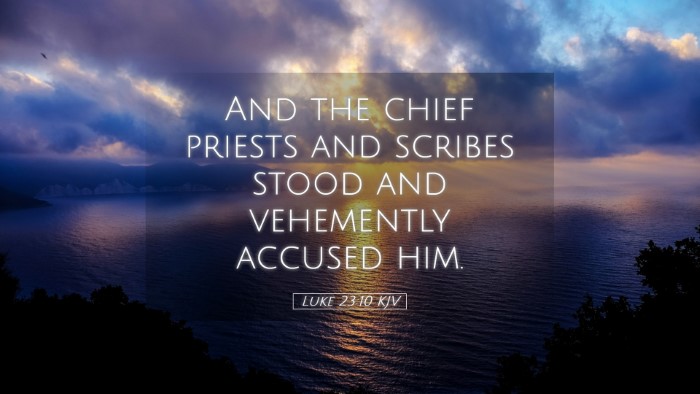Commentary on Luke 23:10
Verse Context: Luke 23:10 states, “And the chief priests and scribes stood, and vehemently accused him.” This verse encapsulates a crucial moment in the Passion narrative, reflecting both the political machinations and the spiritual ramifications of Jesus' trial. It serves as a precursor to the ultimate decision regarding Jesus' fate, highlighting the animosity directed towards Him by the religious leaders of the time.
Historical Context
This scene is set in the courtroom before Pilate, where Jesus is brought to be judged. The chief priests, along with the scribes—who were experts in religious law—are depicted as vehemently accusing Jesus. This moment is significant as it represents a convergence of religious authority and political power, revealing the deep-rooted enmity that the Jewish leaders held against Jesus.
Insights from Matthew Henry
Matthew Henry notes that the actions of the chief priests and scribes demonstrate the malevolence and hatred they harbored toward Jesus. Henry emphasizes their position as custodians of the law, yet they are seen engaging in unlawful behavior by orchestrating accusations based on envy rather than justice. He writes, "They were disturbed not just by His teachings, which challenged their authority, but also by His popularity among the people."
The Nature of their Accusations
According to Henry, the accusations were “vehement,” underlining the intensity and perhaps desperation of the religious leaders. Their efforts to discredit Jesus point to a deeper fear of losing both influence and control. This illustrates a recurring theme in the Gospels where genuine righteousness is countered by self-righteousness.
Insights from Albert Barnes
Albert Barnes provides a detailed exposition on the role of the chief priests and the implications of their actions. He argues that they acted out of a mixture of fear, jealousy, and a desire to maintain the status quo. Barnes suggests that “the priests and scribes felt threatened by Christ's authority and message,” leading them to conspire against Him.
The Political Ramifications
Barnes further explains that the trial scene exemplifies the intersection of religious authority and civil power. The chief priests had a vested interest in preserving their influence over the Jewish people under the Roman governance. Thus, their accusations were not purely religious in nature; they were deeply intertwined with the political situation of the time.
Insights from Adam Clarke
Adam Clarke approaches this passage with an emphasis on the moral and ethical implications of false accusations. He highlights the gravity of standing before an innocent party and falsely accusing them, pointing towards the Ten Commandments' prohibition against bearing false witness. Clarke reflects on how this act of the religious leaders encapsulates the very essence of hypocrisy that Jesus often confronted.
Theological Implications
Clarke also discusses the theological significance of this moment. He posits that the vehement accusations against Jesus serve as evidence of humanity’s rejection of divine wisdom and revelation. "In this act, we see not just the rejection of a prophet but the culmination of a long history of resisting God's messengers," he notes.
Pastoral Reflections
For pastors and theologians, this passage offers rich ground for reflection on the nature of opposition faced by those who seek to follow Christ. The intense accusations hurled against Jesus serve as a reminder of the cost of discipleship. Pastoral teachings can draw parallels between the experiences of the early disciples and the contemporary challenges believers face in a society that often values conformity over conviction.
Application to Modern Faith
- Integrity in Leadership: The actions of the chief priests serve as a warning against the dangers of spiritual leadership devoid of integrity.
- Courage in the Face of Accusation: Believers are encouraged to maintain steadfastness in their faith, much like Jesus did during His trial.
- The Call to Justice: This passage prompts Christians to engage in advocacy for the marginalized, reflecting the righteousness that Jesus embodied.
Conclusion
Luke 23:10 presents a powerful snapshot of the tension between earthly authority and divine truth. As scholars, students, and pastors engage with this verse, they uncover the layers of meaning that inform not only the historical narrative but also contemporary faith. The accusation against Jesus stands as a testament to the struggle between the kingdom of God and the prevailing forces of this world, urging believers to remain vigilant and committed to the truth amidst opposition.


